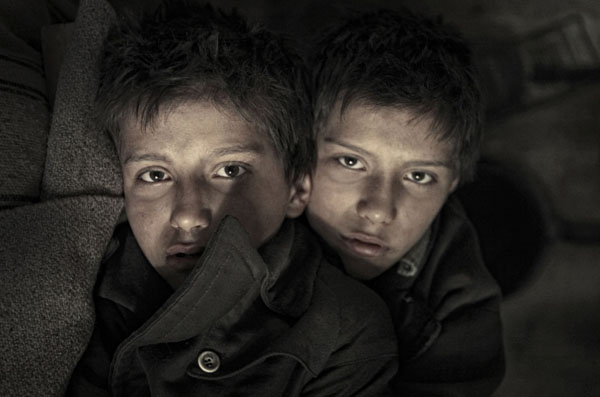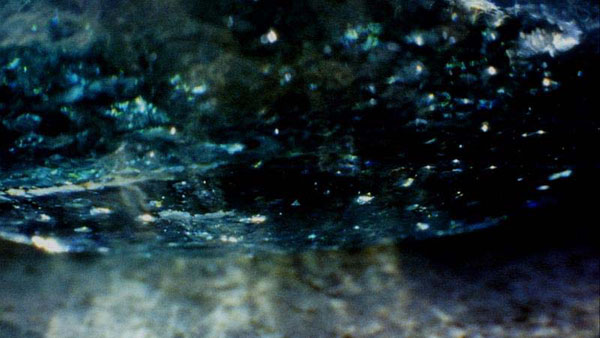Wrapping its 48th edition, the Karlovy Vary International Film Festival has presented its awards, and we’ll get to them in a moment, but first let’s note the surprise appearance by Jafar Panahi—via Skype. Introducing a screening of Closed Curtain, his daughter, Solmaz Panahi, “unexpectedly announced that the director himself would speak to the audience,” as Leo Barraclough reports for Variety, noting that Panahi, currently “under house arrest and waiting to start a six-year prison sentence,” was on the KVIFF jury in 2001. On Wednesday, Panahi told the audience that KVIFF is “one of the festivals I truly love, and when I was here I had the chance to meet with great film-makers who became part of my family. Unfortunately I have lost that family, but my heart is with you. I hope one day that I will be able to make films again, and that I will be able to show them to you. It’s very painful for me not to be part of society, because I make films that are about and focus on society, so I now live in a world of melancholy.”
Well. The awards. The Grand Prix: Crystal Globe goes to János Szász’s The Notebook, “an effective and powerful expose of the horrors of war and how easily childhood innocence can slip away,” as Laurence Boyce describes it for Cineuropa. It’s an adaptation of Agota Kristof’s “heart-rending, French-language WWII bestseller,” notes Boyd van Hoeij in the Hollywood Reporter. “Technically almost too immaculate,” this rendering of the tale of twin 13-year-old brothers “forced to shack up with their evil, country-bumpkin grandmother… smoothens many of the original’s rough edges, replacing the book’s unreliable and disturbing children’s point-of-view with a distancing voice-over, cute animated sequences and two stone-faced performances that make it hard to care about these identical siblings who decide to train themselves in cruelty so they’ll stand a better chance of surviving the war.” Regardless, the film’s also won the Europa Cinemas Label Award.
A Special Jury Prize goes to Ben Wheatley’s A Field in England, and we’ve got a roundup on that one going on right here.
Ólafur Darri Ólafsson wins Best Actor for his performance in Marteinn Thórsson’s XL, “an ugly film, a dirty film, a film that you almost need to take a shower after wallowing in all the filth within,” wrote Swarez at Twitch in February. “It’s not a film for everyone, for sure, but it’s above all a good film.” Ólafsson plays Leifur, an alcoholic Icelandic MP throwing one last party before he enters rehab.
Best Actress goes to Amy Morton, Louisa Krause, Emily Meade, and Margo Martindale, all appearing in Lance Edmands’s Bluebird. The reviews we gathered when it screened at Tribeca emphasized Edmands’s “potent sense of place [with] its wintry Maine locations and a penetrating gaze to blue-collar characters in a depressed mill town,” as David Rooney phrased it in the Hollywood Reporter. Bluebird‘s also won the Ecumenical Jury Award.
Jan Hřebejk’s won Best Director for Honeymoon, which, according to the Telegraph‘s Tim Robey, “has a queasy, jangling verve we might associate more readily with Danish films, and a story durable enough you can well imagine the English-language remake.” More from Guy Lodge at In Contention: “Hřebejk seems to have at least one eye on Renoir’s deathless comedy of manners, The Rules of the Game—which is not to overstate the pleasures of a film that most recalls a wryer, slyer Susanne Bier.” And in the Hollywood Reporter, Boyd van Hoeij notes that Honeymoon “forms a loose trilogy about past secrets with Hřebejk and [screenwriter Petr] Jarchovský’s Kawasaki’s Rose (a 2010 Berlinale selection) and 2011’s Innocence.”
The jury, headed up by Agnieszka Holland, has also given a Special Mention to Joanna Kos-Krauze and Krzysztof Krauze’s Papusza. “Spanning most of the 20th century, this slow but ravishingly beautiful biopic commemorates the life and works of Bronislawa Wajs, the first publicly feted female poet from Poland’s traveling gypsy minority,” writes Stephen Dalton in the Hollywood Reporter. “More generally known by her nickname ‘Papusza’ (‘Doll’), Wajs survived Nazi invasion, Communist persecution and bitter excommunication from her Roma community…. Papusza was clearly a labor of love. Shot in exquisite monochrome by Krzysztof Ptak and Wojciech Staron, every frame is a painterly masterclass in light and shadow…. Even if it undersells its elusive subject a little, [Papusza] rewards the senses with an immersive, melancholy, sumptuous visual symphony.”
“In The East of the West competition, the jury led by Hungary’s Éva Vezér, gave its $20,000 top prize to Floating Skyscrapers by Poland’s Tomasz Wasilewski, report Boyce and Wendy Mitchell in Screen. “A special mention went to Juraj Lehotský’s Miracle from the Slovak and Czech Republics. The documentary jury, chaired by Poland’s Krzysztof Gierat, gave its prizes to Pipeline (Truba) by Vitaly Manskiy [over 30 minutes] and to Beach Boy by the UK’s Emil Langballe [under 30 minutes]. A special mention went to Shawney Cohen’s The Manor from Canada. The independent camera award in the Forum of Independents section went to Things The Way They Are (Las cosas como son) by Chile’s Fernando Lavanderos.”
The Audience Award goes to Alice Nellis’s Revival, while FIPRESCI’s cited Yusup Razykov’s Shame.
Then there are the Crystal Globes for Outstanding Artistic Contribution to World Cinema, three in all. Theodor Pištěk is an artist who won an Oscar for Best Costume Design for Miloš Forman’s Amadeus (1984). Boyce and Mitchell note that Oliver Stone got rather emotional when accepting his: “There has always been a tension that haunted me way before Vietnam. My mother; my father; life itself, all my life. All these tensions will not allow me to let this award—or any this or any others—to stop me looking for the next undiscovered land.”
And the third’s for John Travolta, who was on hand to introduce Mark Steven Johnson’s Killing Season, in which he co-stars with Robert De Niro. The latter’s performance is “glazed-over even by his recent standards,” notes Guy Lodge. De Niro plays “a terminally gruff former army colonel seeing out his retirement in a dingy log cabin in the wooded Deep South: embittered by the Bosnian conflict of the 1990s, he has laid down his arms and assumed a fixed scowl as his weapon of choice. Travolta, by contrast, is making more than enough effort for both of them as the Serbian war criminal once shot and left for dead by De Niro, and now out for retribution. Accessorizing his performance with a satin-sheen buzz cut, profoundly questionable facial hair and a thick Eastern Yoo-ro-pean accent that might kindly be described as ‘committed,’ he’s the liveliest element of a film that takes the windy combat philosophies spouted by these two still-bloodthirsty dinosaurs alarmingly at face value.”
More KVIFF 2013 reviews and coverage: The Hollywood Reporter, Ioncinema, the Playlist, Screen, and Variety.
Update, 7/8: At Indiewire, Boyd Van Hoeij writes up seven highlights.
Update, 7/9: “In my four years attending the Karlovy Vary International Film Festival, this was the first time where tickets for screenings weren’t sold out for every film by 10 a.m. the day prior,” notes Veronika Ferdman at the House Next Door. “The economic wallop that briefly made its presence known at last year’s festival was brutally felt this year in some near-empty screenings, among them a program for avant-garde short films that included David Gatten’s awe-inspiring By Pain and Rhyme and Arabesques of Foraging. The lack of a surfeit of people robbed the screenings of their sense of urgency—that very specific do-or-die feeling you get at a festival when people are elbowing you as they try to shove their way through narrow doors and into the theater at the same time, rushing to find their seats. But the mellow atmosphere didn’t preclude the discovery of a few very good films.”
Update, 7/24: Giovanni Marchini Camia files a report for Film Comment, and Laurence Boyce picks four favorites at Little White Lies.
For news and tips throughout the day every day, follow @KeyframeDaily on Twitter and/or the RSS feed. Get Keyframe Daily in your inbox by signing in at fandor.com/daily.





